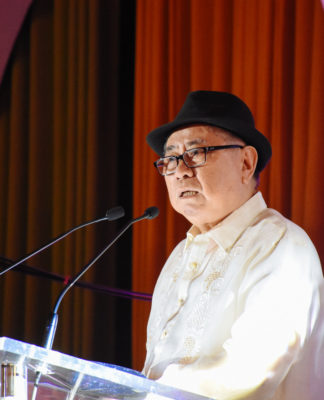RIVAL student political parties Lakas ng Diwang Tomasino (Lakasdiwa) and Lakas Tomasino Coalition (LTC) will once again face off in this year’s Central Student Council (CSC) elections.
The UST Central Commission on Elections (Comelec) announced on Jan. 22 that the two political parties had complied with the requirements set by the UST Students’ Election Code (USEC) of 2011.
Moriah Vernice Mendiola, Comelec chairwoman, said Lakasdiwa and LTC were the only University-wide political parties that applied for accreditation this year.
The date of the filing of candidacy for the CSC elections has yet to be announced.
Lakasdiwa was the sole accredited political party last year but did not field any candidates during elections.
In the 2017 student polls, the party also failed to field a presidential bet, as there was no “competent and willing” member for the highest position. As a result, then medical technology junior Steven Grecia from LTC ran for president unopposed.
LTC did not apply for accreditation last year following its year-long suspension for violating online campaigning rules during the April 2017 elections.
“We acknowledge our suspension due to our past mistakes and shortcomings and we are here to make amends,” LTC Chairwoman Sky Makayan told the Varsitarian in a Facebook message.
“We intend to revitalize not only our party and the principles that we adhere to, but we also intend to once again ignite the trust of the students not only towards us but to the entirety of the system of political parties,” she added.
The Varsitarian has reached out to Lakasdiwa, but it has yet to respond to a request for an interview.
Central political parties are allowed to spend only P2.00 for every student enrolled in the University, which amounts to P80,000, according to USEC. College-based political parties are allowed to spend only P4.00 for every student in the faculty or college.
Founded in 2005 by former CSC auditor Froilan Pipit, LTC was a product of local political parties aiming to form a “united coalition.” Today, it has 16 college-based affiliate parties.
Lakasdiwa was established in 1992 by Errol Lachica as part of efforts to “form a multi-university sector political party” under the Partido Demokratiko Sosyalista ng Pilipinas. The party’s first candidates won seats in the council in 1993 to 1994.
Abstain
Elections in the University are normally successful, but the year 2017 was different.
Probably one of the most controversial student elections in UST, four out of six posts in the council–president, vice president, treasurer and auditor–were left without winners due to massive abstentions among voters.
But the election saga was far from over. In July, Comelec was ordered by the Central Judiciary Board (CJB), CSC’s judicial arm, to proclaim the candidates who lost to “Abstain” votes as winners in the student polls.
“[Comelec] violated [Section 5 of Article 10 of the USEC] by including ‘abstain’ in the ballot as if it is a name of candidate. The said act of Central Comelec, even if previously done, cannot be established into a custom or established practice in contemplation of Article 2 of the Civil Code because it is contrary to the said law,” CJB’s resolution read.
“[T]he abstentions should not have been counted or tallied because they are not votes,” the resolution added.
Article 10 Section 5 of the USEC states that the ballot shall contain the printed names of candidates, their position and their party, a box before the candidates’ names, a serial number and instructions.
In August, Comelec proclaimed Grecia as president, Gabriela Sepulchre as vice president, Daveson Nieto as treasurer and Richard Javier as auditor. Less than a month after, the four rejected their positions and filed their resignation letters.
The officers said they resigned to “maintain unity” among Thomasians amid clamor, particularly on social media, for them to reject their positions to pave way for special elections.
The special elections, however, did not push through despite plans by Comelec, and as a result, only the secretary, Therese Gorospe, and public relations officer Francis Santos, now the council president, were able to serve in the CSC.
Election concerns allayed
Last year, local Comelec units reported that only a short time was given to students for the use of computer laboratories. There was also a lack of facilities.
Comelec chief Mendiola said the poll body was eyeing satellite venues for voting at the Quadrecentennial Pavillion, the Plaza Mayor or the Tan Yan Kee Student Center lobby to address last year’s problems.
Central Comelec is expecting a higher voter turnout this year as it will retain electronic voting. Voters will also be given the option to leave the ballots unanswered as a substitute for “Abstain.”
“’Yong automated [voting] kasi para lang siyang paper ballot na in-automate…[you] can leave some parts doon sa paper ballot as blank [kaya siya ire-retain],” Mendiola said.
Last year, only 26,148 out of a population of 37,658 students, or 69.44 percent, participated in the University-wide student elections. A.V. Ortega













